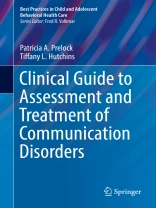This book examines the typical pattern of communication development in children and adolescents to enable primary care physicians as well as other clinicians, therapists, and practitioners to assist parents in making informed decisions based on current research. It offers an overview of communication disorders in children and adolescents that typically present before adulthood. The book describes current assessment, diagnostic procedures, and evidence-based interventions. Chapters outline the standard course of speech milestones and ages to begin screening for deficits and their risk factors. Subsequent chapters review best practices for every aspect of treatment, including care planning, discussing disorders and interventions with parents, making referrals, and collaborating with other providers. The book also discusses evidence-based interventions for specific disorder types such as language impairment, stuttering, language disabilities, and hearing impairment. In addition, the book offers guidance on how to speak about care planning as well as quality of life issues related to communication disorders with other caregivers and parents.
Featured topics include:
- Screening and identification procedures of communication disorders.
- Key elements to providing family-centered care.
- Common causes, assessment, and treatment of specific language impairment (SLI) in children.
- Hearing loss and its impact on the development of communication in children.
- Attention deficit/hyperactivity disorder (ADHD) and the role of attention in the development of language in children.
- Communication development in children with autism spectrum disorder (ASD).
The Clinical Guide to Assessment and Treatment of Communication Disorders is a must-have resource for clinicians and related professionals, researchers and professors, andgraduate students in the fields of child, school, and developmental psychology, pediatrics and social work, child and adolescent psychiatry, primary care medicine, and related disciplines.
Cuprins
Chapter 1. Overview of Communication Disorders.- Chapter 2. An Introduction to Communication Development.- Chapter 3. Approaches to Screening and Identification of Communication Disorders.- Chapter 4. Principles and Practices Guiding Children’s Health and Educational Needs.- Chapter 5. Understanding Late Talkers.- Chapter 6. Children with Specific language impairment.- Chapter 7. Children with Learning Disabilities or Specific Learning Disorders.- Chapter 8. Children with Speech Disorders.- Chapter 9. Children with Hearing Loss.- Chapter 10. Children with Intellectual Disabilities.- Chapter 11. Children with Attention Deficit Hyperactivity Disorder.- Chapter 12. Children with Autism Spectrum Disorder.
Despre autor
Patricia A. Prelock, Ph.D., CCC-SLP, BRS-CL, is Professor and Dean, College of Nursing and Health Sciences and Professor of Pediatrics in the College of Medicine at the University of Vermont. Dr. Prelock coordinates parent training programs designed for caregivers of children with ASD and has been awarded more than 11 million dollars in university, state and federal funding as a PI or Co-PI to develop innovations in interdisciplinary training supporting children and youth with neurodevelopmental disabilities and their families, to facilitate training in speech-language pathology, and to support her intervention work in ASD. She has over 180 publications and 528 peer-reviewed and invited presentations/keynotes in the areas of autism and other neurodevelopmental disabilities, collaboration, IPE, leadership, and language learning disabilities. Dr. Prelock received the University of Vermont’s Kroepsch-Maurice Excellence in Teaching Award in 2000, was named an ASHA Fellow in 2000 and a University of Vermont Scholar in 2003. In 2011, she was named the Cecil & Ida Green Honors Professor Visiting Scholar at Texas Christian University and in 2015 Dr. Prelock was named a Distinguished Alumna of the University of Pittsburgh. In 2016, she received the ASHA Honors of the Association and in 2017 she was named a Distinguished Alumna of Cardinal Mooney High School. Dr. Prelock is a Board-Certified Specialist in Child Language and was named a Fellow in the National Academies of Practice (NAP) in speech-language pathology in 2018. She was the 2013 President for the American Speech-Language Hearing Association and is leading the development of the University of Vermont Integrative Health Program.
Tiffany Hutchins, Ph.D., is an Associate Professor at the University of Vermont. Her research has centered on the relationships from mother-child interaction strategies to social cognition, and child cognitive and language development. She has developed and validated new measures of theory of mind (see https://www.theoryofmindinventory.com/) that can be used in research and practice with typically developing individuals and those with developmental disabilities. She is currently investigating the efficacy of story-based interventions to remediate the core deficits of autism spectrum disorder (ASD). With the use of eye-tracking technology, she has established a new program of research to examine how individuals with ASD allocate visual attention when viewing face stimuli. Dr. Hutchins also examines social cognition or theory of mind in oral and late-signing children with hearing loss. Dr. Hutchins teaches courses in the development of spoken language, cognition and language, measurement in communication sciences, and language disorders.












